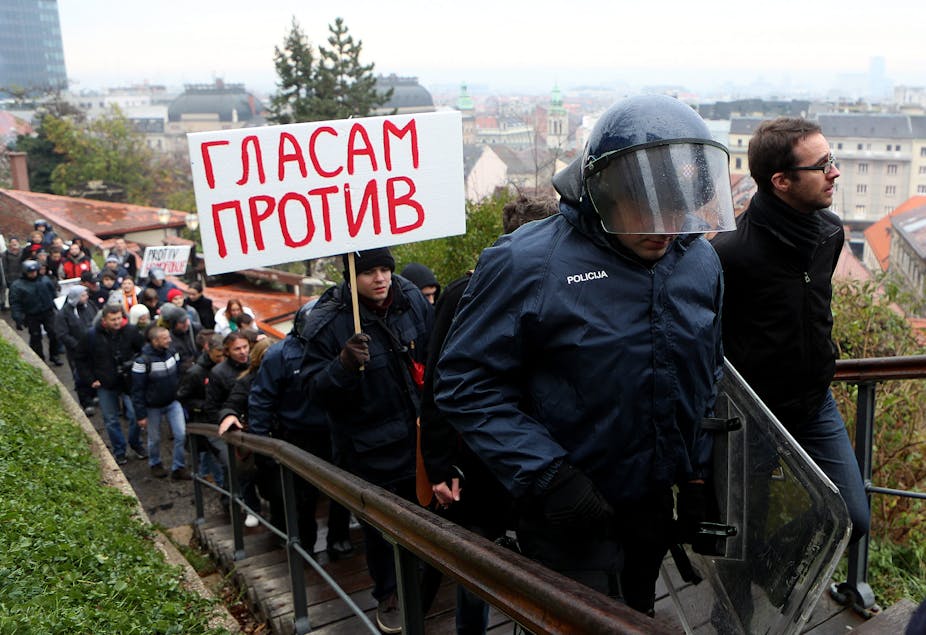Europe is filled with historical fault lines – the Greek-Anatolian, the Balkans, Iberian and central Europe. The European experiment, managed through the ever clunky apparatus of the European Union, has attempted to paper over these problems.
Bureaucracy shall neutralise conflict. At the very least, it will create new products of paperwork: the new European, one of moral uplift and aware of the civil and social liberties associated with the project.
The recent referendum in Croatia, in which 66% of its population supported a constitutional ban on gay marriage, creates the latest flashpoint in the battle over what the paperwork European should look like. The centre-left Croatian government of prime minister Zoran Milanović has supported same-sex marriage. The petitioners favouring a ban got the required 10% or more of registered voters to put the issue to a referendum and the majority rejected the state position.
The initiator of the referendum, Vice John Batarelo, an Australian-born Croat with a nationalist vice, has been saddled with the tag of pioneer – if launching a conservative revolution qualifies him as that. He was opposed to “gender ideology” and keen on using a citizen’s initiative regarding unions.
Gay marriage ban, language next
The referendum on same-sex marriage is to be followed by another: a vote on banning the use of Cyrillic.
Anti-Cyrillic campaigners got a fillip in September when war veterans expressed indignation at the use of new bilingual signs in Latin and Cyrillic in Vukovar, scene of savage fighting during the Balkans wars of the 1990s. In fits of rage, many of the signs were torn down. This inspired Ivan Gavrić of the Committee for the Defence of Croatian Vukovar to push for a collection of signatures to force a referendum.
The administrative measure regarding language was understandable: a third of the population in that region remains Serb. But Gavrić, with a cunning, even beguiling manner, argues that Croatia is simply conforming to EU laws. No, the Croatians would not be discriminating, but simply keen to:
…synchronise Croatian law with that of progressive, Western EU member states.
Minority rights, by Gavrić’s rather obtuse reasoning, should only apply where the minority is a near majority. How easily does nationalist sentiment gnarl logic.
Such views are tense and tedious nonsense. The Serbo-Croat language was a composition of genius, a creature unusual for having both Latinate and Cyrillic script. Serbs use both, while Gavrić and his followers insist that all residents should only use one.
Invariably, such battles of language have repercussions. The Cyrillic dogmatists are bound to want to make a point across the border when the time comes.
Nationalists on the march
When Croatia decided to remove itself from the Yugoslavian federation, it was clear that the nationalist disease had become irrepressible. Croatia proceeded to secede with resolve, removing what Serbs it could from its territories and continuing its effort to build a nationalist Catholic state.
In April 1997, Chris Hedges wrote in The New York Times that fascism had been reborn “as Croatia’s Founding Fathers”. He was not exaggerating. Fascist war songs were sung; the Ustaše Nazi-allied wartime government was being rehabilitated. Much of this was the work of president Franjo Tudjman and his Croatian Democratic Union party.
Hedges noted opposition then, just as there is opposition now, to such nationalist indulgences. Newspaper editor Viktor Ivančić, known for his contrarian work for the satirical Feral Tribune, claimed that the “majority of Croats oppose this rehabilitation”. They were simply crippled by fear, concerned about the potential violence of neo-fascist groups. And so, history repeats itself in bloody rhyme.
The Balkans seemed to be that very invention designed to pose nationalist problems with nationalist non-solutions. Schemes of co-operation have been tried and have not worked. Dissent would disintegrate into bloodshed.

Foreign powers capitalised on this. It is striking that some observers, notably from the non-Western press, argue that the EU’s liberal “dictatorship” is propelling the Croatian nationalist movement. In the Russian paper Pravda, the rather glib observation was made that the “European Union takes Croatia to fascism”.
In the same paper, the views of researcher Anna Filimonova, of the Centre for the Study of the Balkans Crisis Institute of Slavic Studies, make interesting reading. Filimonova told Pravda:
The EU is governed by the norms that seemingly have never been recorded, but that everyone must comply with. We can talk about a certain neoliberal dictatorship…
As the Croatian economy was going to seed, it did not want the EU to dictate “how to behave in intimate life”, Filimonova said. When the house is falling down, you want to preserve all you’ve got.
Of course, the laws do no such thing. The ban suggests compulsion, and the same-sex rules imply choice. But the view is correct on one vital aspect: many states in the EU have had their sovereignty worn down, so much so that their governments remain merely the glorified retainers of Brussels and Luxembourg.
A titanic battle between government will and the voters has ensued. The Croatian government has claimed that it will refuse to abide by a vote for a ban on Cyrillic. It is none too enthusiastic about the negative vote against same-sex marriage either.
These events demonstrate all too clearly how the Croatian problem is a European one writ large, as traditionalist pressures and democratic tensions collide.

